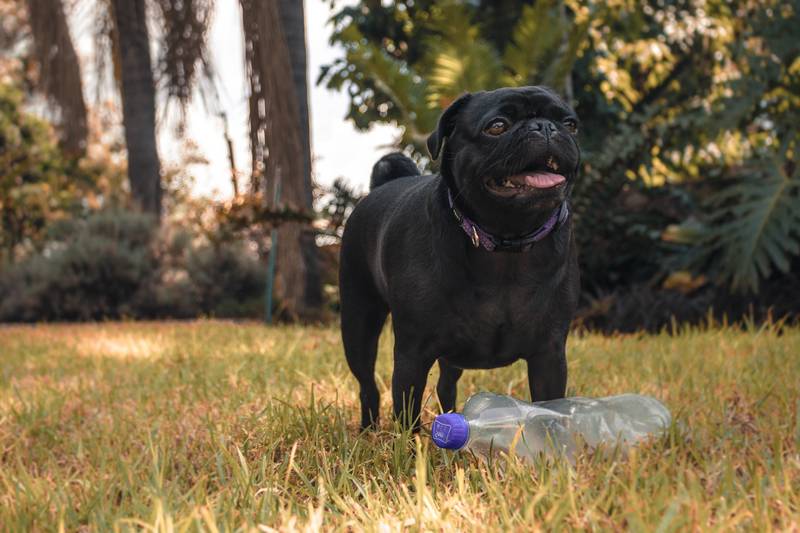Why Does My Dog Chew Plastic? (+How to Stop It!)
“Why does my dog chew plastic?” Is your dog chewing plastic and you keep wondering why, or more importantly, how to stop it? You’re not alone in dealing with this common yet concerning behavior.
This article will shed light on why dogs chew plastic and the risks it poses to their health. We’ll guide you through the steps on how to discourage your dog from this potentially harmful habit. You’ll also find answers to pressing questions like what to do if your dog ate plastic and whether it’s okay for them to chew on hard plastic.
Plus, we’ll touch on the specific issue of your puppy chewing plastic, which has some different concerns. Keep reading below!
Dog Chewing Plastic: How to Stop

To stop your dog chewing plastic, consider managing their environment, engaging them in mental and physical stimulation, providing appropriate chew toys, implementing a ‘leave it’ command, and considering taste deterrents.
- Manage the Environment: Start by making it harder for your dog to access plastic items. Keep doors closed, put away items after use, and make use of high shelves and cupboards. If the plastic object is necessary for daily use and cannot be removed, try to supervise your dog when they are near it. Remember, it’s easier to prevent a behavior from starting than to stop it once it becomes a habit.
- Mental and Physical Stimulation: Often, dogs chew out of boredom. Ensure your dog is getting enough physical exercise and mental stimulation each day. This could include walks, playtime, puzzle toys, or training sessions. If your dog is tired and satisfied, they’ll be less likely to search for things to chew, like plastic items.
- Appropriate Chew Toys: Make sure your dog has access to plenty of appropriate items to chew. These could include dog-safe chew toys, dental chews, or robust and safe rubber toys. Encourage your dog to use these items and reward them when they do. If they are satisfied with their chew toys, they will be less likely to seek out inappropriate items.
- ‘Leave it’ Command: Training your dog to respond to the ‘leave it’ command can be particularly useful. Start training in a controlled environment, slowly moving towards more distracting settings. When your dog responds correctly, immediately reward them. This helps to associate listening to your command with positive outcomes.
- Taste Deterrents: If your dog continues to chew plastic items despite your efforts, consider using a taste deterrent. These are safe sprays with a taste dogs typically find unpleasant. Apply the deterrent to the plastic items your dog usually targets to make them less appealing.
But while these steps will get your dog to stop chewing plastic, you need to remember that the underlying behavioral issue (anxiety, boredom, etc.) that was causing all of this to begin with will still be present. And until you address it, any positive changes you see are only going to be temporary.
“Okay, so how do I make them last then?”
By getting your dog to truly choose to follow your direction, that’s how. I tried many times to write out how you can do that before deciding it made more sense to just link you to the free video series that explains it better than I’d ever be able to.
The series is by a man named Dan who is one of the world’s leading dog obedience trainers. In it, he teaches you how to put an end to things like when your dog chews plastic and all other misbehavior using his fast and easy-to-follow methods.
In the first video, Dan will reveal to you why the two most common methods of dog training only doom you to failure. You can watch the video now by clicking here. Follow the proven system he’ll show you in his series and you’ll never have to spend another second worrying about your dog chewing plastic ever again!
Why Do Dogs Chew Plastic?

Dogs chew plastic primarily due to anxiety, teething, boredom, pica, or attraction to the texture or scent. While it may seem like an unusual behavior, it’s relatively common. However, chewing plastic can be harmful and should be discouraged to prevent potential health issues such as intestinal blockages and exposure to toxic substances.
Anxiety or Stress
Chewing is frequently done as a stress-relieving activity for dogs. If they’re anxious, nervous, or stressed due to changes in their environment or routine, they might chew on items such as plastic as a coping mechanism. Anxiety-based chewing can become a compulsive habit if the source of the anxiety is not addressed.
Teething and Desire for Oral Stimulation
Much like human babies, puppies go through a teething phase when their adult teeth start to emerge. This process can be uncomfortable for them, leading them to chew on various objects, including plastic items, to relieve the discomfort. Moreover, dogs of all ages can have a natural desire for oral stimulation, which can lead them to chew on different textures, including that of plastic.
Boredom and Lack of Mental Stimulation
Dogs, especially active breeds, require a fair amount of mental and physical stimulation. If they’re bored or not getting enough exercise, they may resort to destructive behaviors such as chewing on items around the house, including plastic objects. This behavior can be an attempt to self-stimulate and alleviate feelings of restlessness or frustration.
Pica and Nutritional Deficiencies
If a dog keeps chewing plastic and other non-food items, they may have a condition called pica. While the exact cause of pica is not fully understood, it can sometimes be associated with nutritional deficiencies or underlying health conditions. If you notice this behavior in your dog, it’s worth consulting a vet to rule out any potential medical issues.
Attraction to Scent or Texture
Dogs have an incredible sense of smell and might be attracted to plastic items that carry food or other enticing scents. Similarly, the crinkly texture of some plastic items could be appealing to them and motivate the chewing behavior.
Managing Your Dog’s Plastic-Chewing Behavior
Given that chewing plastic can present health risks for dogs, it’s important to manage this behavior. Offering suitable chew toys, ensuring adequate exercise, mental stimulation, maintaining a dog-safe environment, and addressing potential underlying health issues or anxiety can help stop your dog chewing plastic. We explain the steps to do this in the first section.
You’ll want to get started on this issue right away, because not doing so just means it will get even worse. If they’re not already, you’ll soon also find that your dog chews metal, chews window sills, chews baseboards, and maybe even chews mulch.
Obviously, you don’t want any of that happening (especially since it could be an indication of underlying anxiety, etc.), so you should get to work with them on stopping the behavior right away.
My Dog Ate Plastic, What Do I Do?
If your dog ate plastic, you need to act quickly and contact your vet. Depending on the situation, they may suggest inducing vomiting, performing surgery, or monitoring your dog’s health for signs of complications. Here are some steps to take if your dog ingested plastic:
- Contact Your Vet: As soon as you realize your dog has ingested plastic, contact your vet immediately. Provide them with as much information as possible, such as the size, type, and amount of plastic eaten, as well as your dog’s size, age, and general health. This information will help your vet determine the best course of action.
- Monitor Your Dog: Keep an eye on your dog’s behavior and watch for any signs of discomfort. These could include vomiting, diarrhea, loss of appetite, abdominal pain, or lethargy. These symptoms might suggest an intestinal obstruction, which requires immediate veterinary attention.
- Do Not Induce Vomiting Without Vet Approval: While it might seem like a good idea to make your dog throw up, doing so can sometimes cause more harm than good. Sharp pieces of plastic can cause damage to the esophagus on the way back up. Always consult your vet before attempting to induce vomiting.
- Be Prepared for Potential Surgery: If the plastic item is large or causing a blockage, surgery may be necessary to remove it. Be prepared for this possibility and discuss it with your vet. Early intervention can significantly improve the outcome.
- Prevent Future Incidents: After the immediate crisis has passed, work on prevention strategies to keep this from happening again. This could involve better management of the environment, obedience training, or providing appropriate chew toys. We explain how you can do this in the first section.
Remember, when in doubt, always consult with your veterinarian. Swift action can be crucial in preventing further complications when your dog has eaten plastic.
Dog Chews Plastic: Is It Okay?
No, it is not okay for dogs to chew plastic. Chewing plastic can lead to a multitude of health problems, including choking, intestinal blockages, and damage to the mouth and digestive tract. Moreover, some plastics contain harmful chemicals.
- Health Risks: When dogs chew on plastic, they risk swallowing pieces that can become lodged in their digestive tract, causing blockages that may require surgical intervention. Additionally, sharp edges can cut a dog’s mouth or cause damage to their esophagus and stomach. Some plastics also contain harmful chemicals, such as phthalates and BPA, which can be toxic if ingested.
- Behavioral Issues: A dog chewing on plastic might also indicate underlying behavioral issues such as boredom, anxiety, or lack of mental stimulation. It’s important to provide your dog with plenty of exercise, interactive toys, and mental challenges to keep them occupied and help prevent destructive behavior. We explained more in the first section.
- Safe Alternatives: Provide your dog with safe chew toys to satisfy their natural urge to chew. Chew toys designed for dogs are durable and often offer additional benefits, like teeth cleaning or stuffing for mental stimulation. Always choose toys appropriate for your dog’s size and chewing style.
- Training and Management: Training your dog to “leave it” or “drop it” can be an effective tool in managing this behavior. Furthermore, manage your dog’s environment to minimize access to plastic items. This could involve securing trash cans or keeping chewable items out of your dog’s reach.
While chewing is a natural behavior for dogs, it’s crucial to ensure they’re chewing on the right things. Be vigilant about what your dog has access to and provide them with appropriate alternatives to keep them safe and satisfied. For more help on getting your dog to stop chewing on plastic, go back to the first section now where we’ll give you the steps to follow.
Why Does My Dog Chew on Hard Plastic?
Dogs chew on hard plastic primarily due to anxiety, teething, attraction to the texture, boredom, or pica. While it’s a fairly common behavior, it’s important to note that it can be dangerous, potentially leading to health issues such as dental damage and intestinal blockages.
Anxiety or Stress
For dogs, chewing can act as a stress reliever. If your pet is experiencing anxiety, changes in environment, or stress, they may resort to chewing on items like hard plastic as a coping strategy. This behavior can develop into a habit if the root cause of the stress isn’t addressed.
Teething and Oral Stimulation
Puppies, much like human infants, undergo a teething process when their adult teeth start to come in. This can cause discomfort, prompting them to seek out various objects to chew on, such as hard plastic, which provides relief. Dogs of all ages might also crave oral stimulation, finding the texture of hard plastic interesting to gnaw on.
Boredom and Lack of Mental Stimulation
If dogs are not provided with enough mental and physical stimulation, they may resort to destructive behaviors like chewing on hard plastic and other objects around the house. This is a means of self-stimulation, a way to combat boredom and occupy themselves.
Pica and Possible Nutritional Deficiencies
Persistent chewing of non-food objects like hard plastic can indicate a condition known as pica. While the cause of pica remains somewhat unclear, it can sometimes be linked to nutritional deficiencies or underlying health problems. If you observe this behavior consistently in your dog, a visit to the vet for a health check is advised.
Attraction to Texture or Scent
The unique texture of hard plastic can be attractive to dogs, encouraging them to chew. Additionally, if the hard plastic items hold scents that are enticing to your dog, such as food residue, they may be more likely to chew on them.
Addressing the Issue of Chewing Hard Plastic
Given the potential risks associated with your dog chewing hard plastic, it’s important to stop this behavior. Providing appropriate chew toys, ensuring your pet has plenty of exercise and mental stimulation, and keeping a dog-safe environment are good starting points, but you should also teach commands like “leave it,” which we explained in the first section.
Puppy Chewing Plastic
If you have a puppy chewing plastic, it’s important to discourage this behavior immediately. Chewing plastic presents numerous risks such as choking, digestive blockages, and ingestion of harmful chemicals.
- Puppy Teething: Puppies, much like human babies, go through a teething stage which can cause them to chew on objects to alleviate discomfort. However, plastic is not a safe option for this purpose. Use puppy-specific teething toys or chewable treats to help them through this period safely.
- Behavioral Considerations: Chewing can also indicate boredom or anxiety. Ensure your puppy is getting enough physical exercise and mental stimulation through play and training sessions. Remember that puppies are naturally curious, so provide them with appropriate outlets for exploration and chewing.
- Safe Alternatives: Provide your puppy with safe, durable chew toys that are appropriate for their age and size. This will give them a proper outlet for their chewing instincts and keep them away from unsuitable items like plastic. Chew toys can also help in their dental health by reducing plaque build-up.
- Training: Teaching the commands “leave it” and “drop it” can be especially helpful if your puppy keeps chewing plastic. This gives you a way to interrupt and redirect your puppy’s attention when they start showing interest in chewing inappropriate items. Learn how to do these commands in the first section.
Keeping a puppy from chewing plastic requires a mixture of vigilance, training, and providing suitable alternatives. Remember, your young puppy is learning about the world, and with your guidance, they can learn what’s safe and acceptable to chew.
I’m sure you’re ready to stop worrying about your dog chewing plastic, so I’ll let you get started on all of this now. Best of luck, and thanks for reading our article “Why Does My Dog Chew Plastic? (+How to Stop It!)”





